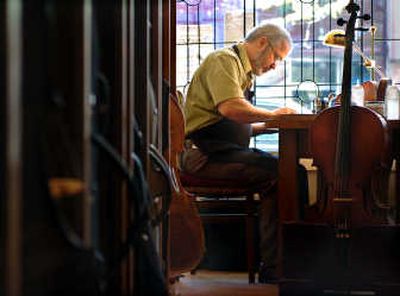Craftsman fills niche with violin shop

On a table next to the window, a dismantled violin rests on a pile of wood shavings.
Clad in a blue apron, apprentice luthier Caridwen Spatz works to transform the unlovely school instrument into something that just might make beautiful music.
As Spatz labored, she was surrounded by new and restored instruments at Violin Works in the heart of the Garland business district. Owner James Kytonen opened the store five years ago.
So how does a former student of clinical psychology end up making violins?
“Really bad luck,” Kytonen said with a wry grin.
He grew up loving music and began playing guitar at age 6. Several years ago, he was one of only four people building Celtic harps in the United States.
“There’s not much market for Celtic harps,” he said. “We had to create a market.”
While attending Eastern Washington University, Kytonen began repairing school instruments at a shop in Spokane Valley.
There, he met Gene Cole, a noted luthier. “We just hit it off,” said Kytonen. “I had an informal apprenticeship with him. I still do.”
Through Cole’s mentoring, Kytonen trained in the German tradition of instrument restoration. He soon focused his attention on crafting violins instead of Celtic harps.
“What lured me away was the art of this,” he said, gesturing at a beautiful specimen nestled in a glass case. “Each violin has a story.”
Indeed, the gleaming burnished-wood instruments displayed throughout the store seem more like pieces of art than musicians’ tools.
The mathematical precision of the craft coupled with its creativity made this business a perfect fit for Kytonen.
Though he has been frustrated by the lack of benchmarks and standards for luthiers, he said, “This is how we adjudge somebody: Everyone is an apprentice. A journeyman is someone who has acquired an ability. A master is someone who has become creative.”
Kytonen finds a parallel between his business and his life.
“If you’re going to be a decent person, take great care of your name and reputation,” he said.
His reputation as a fine craftsman draws clients from all over the Inland Northwest and beyond. Kytonen is proud that his client list includes principals of the Spokane Symphony Orchestra as well as national fiddle champions.
But he believes beginning students should demand quality as well. “I’m trying to train people to expect custom work done on their instruments,” he said.
Kytonen’s business fills an unusual niche. “Most builders don’t restore, and most restorers don’t build,” he said. But Violin Works affords him the ability to do both.
“You get a lot of time to think when you do this kind of work,” Kytonen said.
He selected a violin from a display shelf and handed it to Spatz. In addition to learning this craft, she teaches violin at Holy Names Music Center at Fort Wright and is an accomplished performer.
She plucked a few strings and then picked up the bow.
Suddenly, a gust of music swelled and filled the small shop. The sound of the busy Garland Avenue traffic disappeared, swallowed by the haunting notes.
“Our job is to make the violin as transparent as possible,” Kytonen said, “so that when a musician plays, whatever is jumbling around inside comes out when they use this tool.”